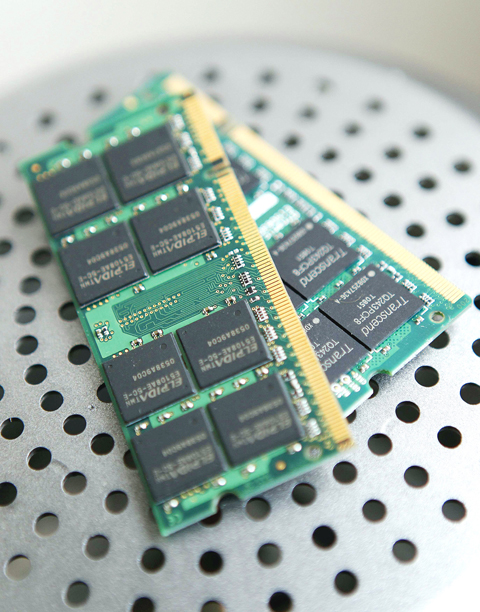Powerchip Semiconductor Corp (力晶半導體), the nation’s No. 2 computer memory chipmaker, submitted a proposal to the Industrial Development Bureau (IDB) yesterday for state funding, following in the footsteps of Taiwan Memory Co (TMC, 台灣創新記憶體公司).
The IDB set a three-month period, starting in July, for local companies to submit proposals about joining the central government’s efforts to rejuvenate the nation’s PC memory, or dynamic random access (DRAM), sector, in exchange for a capital injection from the state.
Powerchip filed its proposal right before yesterday’s deadline on its own, since its technological partner Elpida Memory Inc has formed an alliance with TMC.

PHOTO: NICKY LOH, REUTERS
“We will meet the government’s requirements. We are technologically independent [as the government requested.] We will make chips on technologies we have developed ourselves,” Powerchip spokesman Eric Tang (譚仲民) said by telephone.
Without consolidating any capacities owned by existing memory chipmakers, Powerchip said it planned to allocate part of its DRAM capacity for flash memory chips, which should be seen as a kind of consolidation, Tang said.
The nation’s biggest computer memory chipmaker Nanya Technology Corp (南亞科技) and its joint venture with Micron Technology Inc, Inotera Memories Inc (華亞科技), however, have decided not to seek government funding.
“The DRAM industry is different from what it was a year ago. The best timing for DRAM reformation or consolidation under this scheme has passed. To consolidate partial capacity would not do much to help DRAM restructuring,” the two companies said in a joint statement yesterday.
The Nanya-and-Micron camp was originally seen as a potential contender for the government funding. With full financial backing from fellow Formosa Plastic Group (台塑集團) companies, Nanya has never shown any eagerness for a capital infusion from outside the group.
The IDB said it has not set any timetable for reviewing funding applications. TMC has requested NT$5 billion (US$155 milion) instead of the NT$10 billion it originally planned.
Meanwhile, Nanya and Inotera said they are converting their manufacturing process technology to 50-nanometer technology to lower substantially reduce manufacturing costs.
Mass production of 40-nanometer technology is expected to start in the second half of next year, in collaboration with Micron.

A proposed 100 percent tariff on chip imports announced by US President Donald Trump could shift more of Taiwan’s semiconductor production overseas, a Taiwan Institute of Economic Research (TIER) researcher said yesterday. Trump’s tariff policy will accelerate the global semiconductor industry’s pace to establish roots in the US, leading to higher supply chain costs and ultimately raising prices of consumer electronics and creating uncertainty for future market demand, Arisa Liu (劉佩真) at the institute’s Taiwan Industry Economics Database said in a telephone interview. Trump’s move signals his intention to "restore the glory of the US semiconductor industry," Liu noted, saying that

On Ireland’s blustery western seaboard, researchers are gleefully flying giant kites — not for fun, but in the hope of generating renewable electricity and sparking a “revolution” in wind energy. “We use a kite to capture the wind and a generator at the bottom of it that captures the power,” said Padraic Doherty of Kitepower, the Dutch firm behind the venture. At its test site in operation since September 2023 near the small town of Bangor Erris, the team transports the vast 60-square-meter kite from a hangar across the lunar-like bogland to a generator. The kite is then attached by a

Foxconn Technology Co (鴻準精密), a metal casing supplier owned by Hon Hai Precision Industry Co (鴻海精密), yesterday announced plans to invest US$1 billion in the US over the next decade as part of its business transformation strategy. The Apple Inc supplier said in a statement that its board approved the investment on Thursday, as part of a transformation strategy focused on precision mold development, smart manufacturing, robotics and advanced automation. The strategy would have a strong emphasis on artificial intelligence (AI), the company added. The company said it aims to build a flexible, intelligent production ecosystem to boost competitiveness and sustainability. Foxconn

Leading Taiwanese bicycle brands Giant Manufacturing Co (巨大機械) and Merida Industry Co (美利達工業) on Sunday said that they have adopted measures to mitigate the impact of the tariff policies of US President Donald Trump’s administration. The US announced at the beginning of this month that it would impose a 20 percent tariff on imported goods made in Taiwan, effective on Thursday last week. The tariff would be added to other pre-existing most-favored-nation duties and industry-specific trade remedy levy, which would bring the overall tariff on Taiwan-made bicycles to between 25.5 percent and 31 percent. However, Giant did not seem too perturbed by the